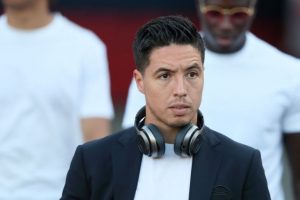Samir Nasri, a professional soccer player from France, has been given an 18 month suspension for violating anti-doping regulations in 2018.

According to the Union of European Football Association, the organization that handed down the 18 month suspension to Nasri in the first place, this athlete had flown to Los Angeles in the United States to take advantage of an IV based performance-enhancing drug “drip” treatment that has been banned in professional soccer for years.
According to UEFA, Nasri was looking to leverage a medical procedure known as an intravenous infusion of vitamins. This treatment protocol essentially hooks up athletes to an IV, pumps vitamins directly into their body, and helps them to rehab and restore their injuries a lot faster than they would have been able to otherwise.
It isn’t all that often that a professional athlete (anywhere in the world) catches a significant suspension like this one without having used anabolic steroids or other performance-enhancing drugs. But UEFA has classified this kind of procedure as illegal under their rules of competition, and Nasri was well aware of these rules before he decided to fly to the United States and move forward with the procedure.
The clinic that he visited, Drip Doctors, has been upfront and honest about the fact that they treated Nasri to begin with. They released a public statement on Twitter, telling the world that they did in fact provide Nasri with what they called an “Concierge Immunity IV”, a procedure that they say restores hydration levels and improve the overall health and wellness of athletes while they are competing.
Interestingly enough, UEFA only learned of this breach in protocol AFTER the Drip Doctors published that Nasri was a client of theirs on social media. He was given an initial six-month suspension after the news was released, even though he had never tested positive for using performance-enhancing drugs – including during the block of time where he was receiving these intravenous IV injection.
Nasri went on to request that his suspension would be backdated, giving him an opportunity to continue to compete at the highest levels of European football. UEFA declined his request, even after Nasri admitted to having a 500 mL intravenous injection of vitamins and micronutrients. He provided a full breakdown of the substances that were injected into his body, proving that there were no performance-enhancing drugs or explicitly prohibited substances contained within his IV.
This wasn’t enough to sway the governing body of UEFA, as they have banished the use of IV infusions for any reason whatsoever aside from therapeutic use exemptions that come with a legitimate medical doctor’s clearance. Any infusions that exceed 50 mL within a six hour block of time are also banned by the World Anti-Doping Agency, and Nasri would have run afoul of those rules and regulations as well should UEFA had decided to lower his suspension.
Because of his outspoken disagreement with the ruling, the UEFA Control, Ethics, and Disciplinary Body decided to amend his suspension – increasing it up to 18 months from six months. He appealed to the Court of arbitration for Sport, but this governing body also determined that he had violated the rules and regulations as put forward by UEFA even if he hadn’t used performance-enhancing drugs explicitly.
Nasri now finds himself wrapped up in a tremendous amount of controversy, involving a unique string of messages posted on social media that accused the Drip Doctors of providing sexual services in his hotel room following the IV injection he received. Nasri later deleted these messages completely, and both parties no longer comment on the situation at all.
Nasri remains suspended and a free agent.


